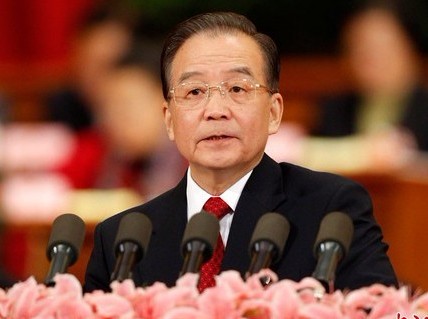美國《華爾街日報》記者:
總理您好。請問通貨膨脹現(xiàn)在成為中國社會越來越突出的一個問題,高物價、高房價已經(jīng)直接影響到老百姓日常的生活。那么您如何評價政府已經(jīng)采取的措施呢?下一步有什么新的措施出臺?在應對通貨膨脹,您會不會考慮讓人民幣較快速度的升值?謝謝。
I'm with Wall Street Journal. Inflation has become an acutely-felt problem in China's society. We have seen that rising commodity prices and housing prices have exerted direct impact on the day-to-day lives of the ordinary Chinese people. I would like to ask: how do you evaluate the measures that the central government has adopted to fight inflation. And what new measures will the government take to combat inflation in the future? Will the government consider letting the RMB appreciate faster in fighting inflation?

溫家寶:
通貨膨脹就像一只老虎,如果放出來就很難再關進去。我們目前出現(xiàn)的通貨膨脹其實是國際性的,如果你看看整個國際的形勢,由于某些國家實行量化寬松的貨幣政策,而造成匯率和大宗物資價格的大幅度波動。這不僅影響一個地方,就連歐洲也突破了2%。前幾個月,世界糧價上漲15%,如果再加上西亞北非局勢的影響,油價高企超過每桶100美元。輸入型的通貨膨脹對中國有很大的影響,這也是我們難以控制的。另一方面,確實在我們國內也有因為勞動力成本提高,各種初級產品價格上漲而造成的結構性通貨膨脹。我們必須重視解決這些問題。我常講通貨膨脹包括物價、房價都涉及人民群眾的生活,關系到他們的切身利益。因此,我們今年在政府宏觀調控的各項工作中,把抑制通貨膨脹擺在了第一位。
Inflation is like a tiger, once set free it will be very difficult to bring the tiger back into its cage. I believe that the current inflation we are witnessing is actually a global issue. Let's take a look at the international environment in this respect. Some countries have pursued a quantitative easing monetary policy, and that has caused drastic fluctuations in exchange rates in some major currencies and the global commodity prices. This has not only affected one place or region in the world. Actually, we have seen an around 2% inflation rate in European countries. In the past few months, the global grain prices have risen by 15%. And the situation in some north African and western Asian countries has driven up global oil prices, and that price has hit over $100 per barrel. The important inflation has had a big impact on China and it is a factor that is not easy to control. At the same time, we have also witnessed a structural inflation in China due to rising labor cost and rising prices of primary goods. We must pay very close attention to this problem and take strong steps to address it. I have often said that inflation including rising consumer and housing prices affects the immediate interests of the people. That is why the government has given top priorities to curbing inflation for its macroeconomic control this year.
關于管好通脹預期,抑制通貨膨脹所采取的措施,在我的《政府工作報告》里已經(jīng)詳細地講了。我不想再過多地重復。我只是講,對于管好通脹預期我們還是有信心的。去年11月份,我們物價高企達到5.1%。12月份,經(jīng)過努力,我指的是消費物價水平降到4.6%。今年上半年是我們比較困難的時期,大概記者先生也懂得因為翹尾因素影響大。1月份,我們的CPI達到4.9%;2月份,還保持在4.9%。但你知道,2月份的翹尾因素的影響高達3.7%。對于物價,我們不敢掉以輕心。我們是從三個方面來努力管好通脹預期的。首先,要發(fā)展生產,特別是農業(yè)生產保障供給;第二,加強流通,特別是要加強農產品流通這個薄弱環(huán)節(jié);第三,主要用經(jīng)濟和法律的手段管好市場。我們將持之以恒地把這項工作做到底。至于房價,我們也是三管齊下。第一,還是要控制貨幣的流動性。我想補充一點,對于物價這一點也是重要的,也就是說消除房價物價上漲的貨幣基礎。第二,運用財政、稅收和金融的手段來調節(jié)市場的需求;第三,加強地方政府的責任,無論是物價和房價,地方都要切實負起責任來。也就是說“米袋子”省長負責制,“菜籃子”市長負責制,房價也由地方來負主要責任。
I have explained the measures that we will adopt to control inflation and manage inflation expectations in my Government Work Report in great detail, so I will not repeat the measures here. I just want to emphasize that the government has the confidence that it will be able to anchor inflation expectations. In November last year, China's consumer price index rose by 5.1%. With our hard efforts, we managed to bring it down to 4.6% the next month that is December last year. We still face difficult situation in the first half of this year, I'm sure that you are well aware of the carry-over effects on the CPI. In January this year, the CPI rose 4.9% and stayed at the same level in February. But we have a strong carry-over effect, standing at 3.7%. Therefore, we must not take this issue lightly. We have taken the following measures to manage inflation expectations: First, we will continue to develop production, in particular agricultural production to ensure sufficient supply; Second, we improve the distribution system, in particular we will enhance the weak links in agricultural product distribution; And third we will mainly make use of economic and legal instruments to manage the market and maintain good market order. We will continue to take persistent efforts to manage the inflation expectations. Our measures to bring down the rising housing prices are three-fold: First, we must mop up excess liquidity. That is actually important for both controlling the housing prices and the consumer prices because that will help us eliminate the monetary conditions for surging consumer and housing prices; Second, we will make use of a fiscal taxation and financial instruments to adjust market demand; And third, we must intensify the responsibility of local governments' responsibilities for controlling consumer and housing prices. That include the governor's provinces will take responsibility for the supply of stable foods and the mayors will be responsible for the supply of vegetables. And in terms of bringing down surging housing prices, it is the local governments that will assume the general responsibility.
你關心人民幣升值問題,我可以告訴你,我們將繼續(xù)堅持人民幣匯率形成機制的改革不動搖。如果從1994年算起,我們大的人民幣匯率改革已經(jīng)進行了3次。那么現(xiàn)在同1994年相比,人民幣的有效匯率升值57.9%。我們這次改革主要是改變單一的盯住美元,而實行根據(jù)市場需求,參照一攬子貨幣,實行有管理的浮動匯率制度。我們將根據(jù)市場需求的變化來進一步加大人民幣浮動的彈性。但同時我們也必須考慮這種升值還是漸進的,因為它關系到企業(yè)的承受能力和就業(yè),我們要保持整個社會的穩(wěn)定。
You have a keen interest of in the appreciation of Chinese RMB. I would like to say that we will continue to pursue our reform of the Chinese RMB exchange rate regime. Actually we have taken three major steps in pushing forward this reform since 1994. And since 1994, the real effective exchange rate of the Chinese Yuan has appreciated by 57.9% against the dollar. Our practice has been to de-peg the Chinese yuan from the US dollar and we pursue a managed and floating exchange rate, RMB exchange rate regime on the basis of market supply and demand and with reference to a basket of currencies. We will continue to make the RMB exchange rate more flexible in line with the changes in market supply and demand. At the same time, the appreciation of the Chinese currency should be a gradual process because we must bear in mind its impact on the Chinese businesses and our employment situation. We must ensure overall social stability in this process. Thank you!











